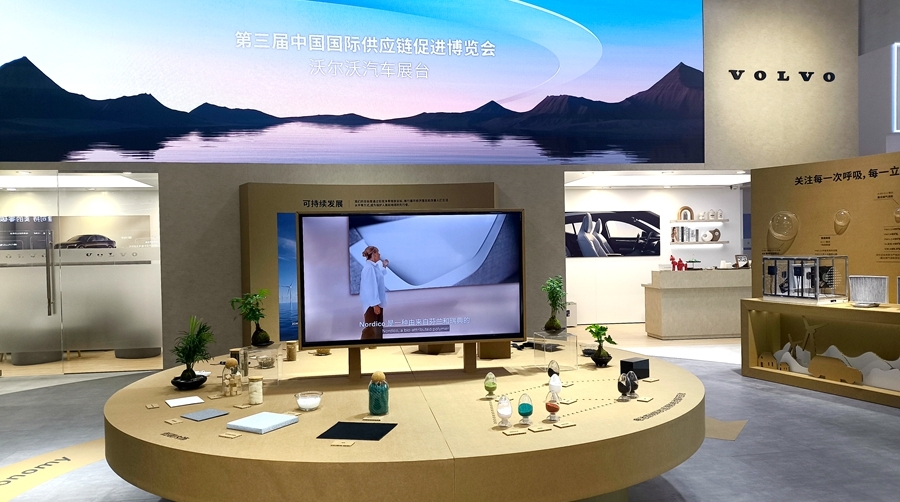
A view of Volvo's exhibition stand at the third China International Supply Chain Expo in Beijing, July 16, 2025. [Photo by Xu Xiaoxuan/China.org.cn]
Swedish automaker Volvo is showcasing its health-focused vehicle technology at the third China International Supply Chain Expo this week, emphasizing its commitment to sustainability and passenger safety.
The automaker has implemented strict controls on in-car materials to protect human health. While Chinese regulations ban six hazardous substances, including PBB, hexavalent chromium and lead compounds, Volvo restricts more than 6,000 substances in its vehicles. The company excludes known contact allergens from components such as seat leather and rubber door seals.
Volvo also enforces stringent standards for volatile organic compounds beyond national requirements. The company regulates 11 additional harmful volatiles at the parts level to protect interior air quality.
Interior air cleanliness remains a priority for the automaker. Volvo's systems monitor particulate matter, including PM2.5, PM1 and PM0.3, along with ozone and pollen levels. A company representative at the expo said Volvo's air conditioning filters contain high-grade activated carbon with increased thickness and density for superior pollutant absorption. The brand's Advanced Air Cleaner system provides enhanced PM2.5 filtration efficiency.
Volvo has established a specialized "nose team" that evaluates in-car odors to further ensure air quality. The company uses a six-level classification system for interior air: Level 1 indicates an almost undetectable scent, Level 3 represents a noticeable but acceptable smell, and Level 6 is considered intolerable. Only vehicles rated Level 3 or below meet Volvo's internal air quality standards.
Sustainability represents another key focus area for the automaker. Volvo is incorporating recycled and renewable materials into vehicle interiors, including low-carbon trims made from recycled PET bottles and soy-based foam for seat cushions. The company is also investing in battery recycling to reduce environmental impact.
A company representative said these efforts align with China's goals to peak carbon emissions before 2030 and achieve carbon neutrality before 2060, and reflect Volvo's broader sustainability strategy.
The company is also working to reduce average emissions per vehicle to achieve net-zero by 2040 and plans to become a fully circular business by the same year. Through collaboration with partners across its value chain, Volvo seeks to improve and protect lives while contributing to a more sustainable society.


 Share:
Share: 




 京公網(wǎng)安備 11010802027341號
京公網(wǎng)安備 11010802027341號